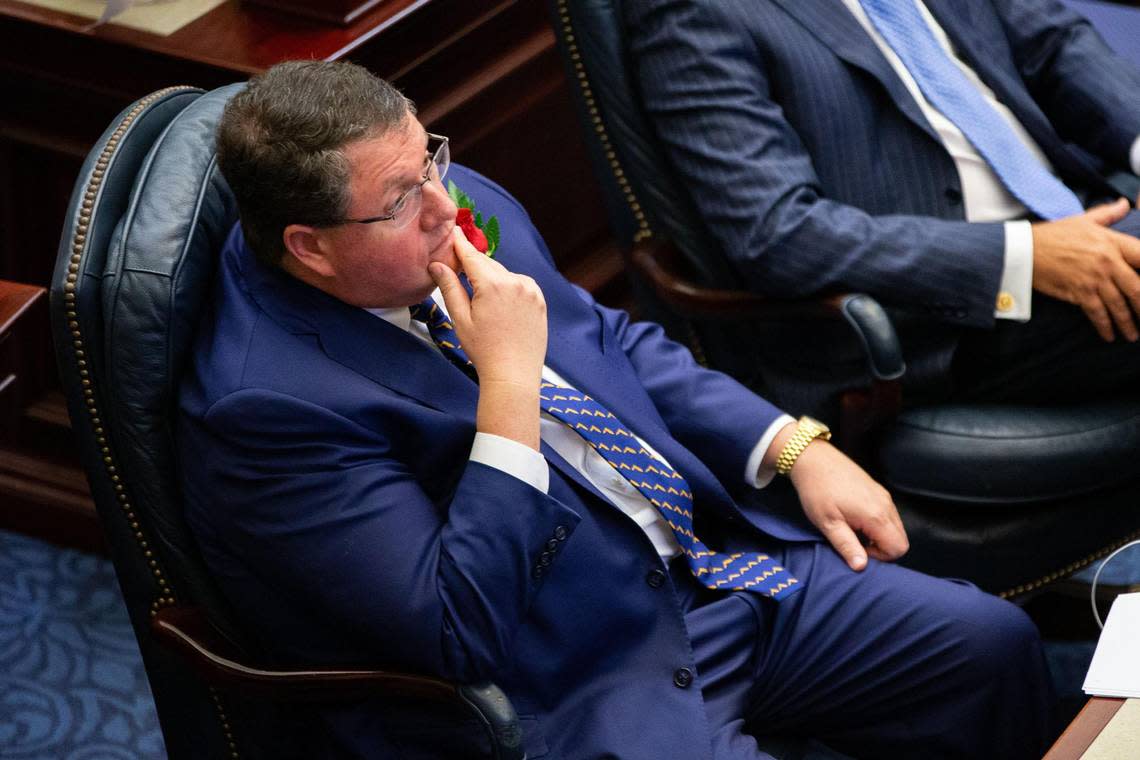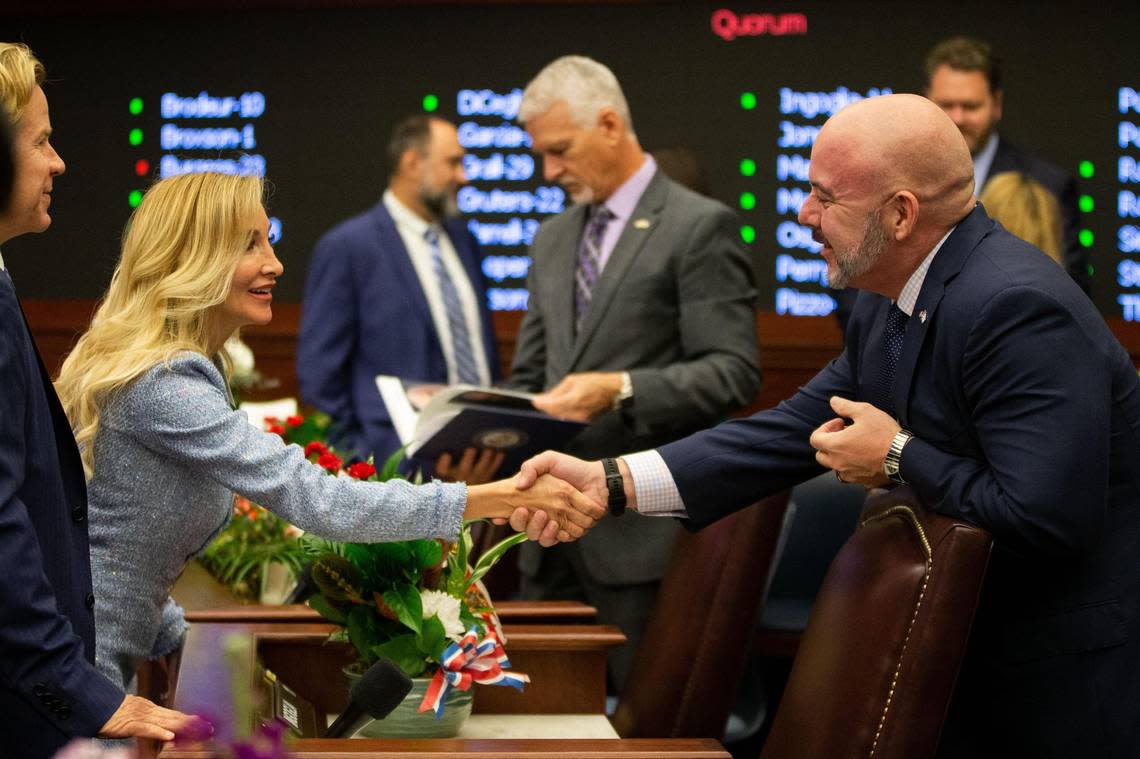DeSantis opens legislative session, promising more to come in culture wars, abortion bans
Proclaiming “you ain’t seen nothing yet,” Gov. Ron DeSantis used the first state of the state speech of his second term Tuesday to aim at a national political audience and give a nod to a cooperative Republican-led Legislature that vowed to work together to pass his agenda.
“We defied the experts. We buck the elites. We ignored the chatter. We did it our way, the Florida way,’’ DeSantis declared as lawmakers gaveled in their annual 60-day legislative session.
The 30-minute address was markedly less political than his recent speeches at fundraisers and book talks around the country with the release last week of his political memoir, ”The Courage to be Free.” But DeSantis hinted at more political skirmishes to come as he puts Florida at the forefront on the battlefield of the culture wars, as a cooperative Legislature has already proposed a slate of bills that keep it there.
“I can promise you this, you ain’t seen nothing yet,’’ he concluded.
READ MORE: DeSantis’ state of state speech mirrors many of the themes of other GOP governors
Within minutes of the opening session, Republicans filed a bill the governor sought that imposes new penalties on organizations that help illegal immigrants, and a bill to reduce the ban on abortions from 15 weeks to six in Florida, even though the 15-week ban is still pending a ruling from the Florida Supreme Court.
In his speech, the governor made no mention of expanding the abortion ban, and unlike Republican governors in other states, did not offer to provide assistance to new parents except for a sale tax exemption for diapers.
“Having a child will be tax free,’’ he said. “We are proud to be pro-family, and we are proud to be pro-life in the state of Florida.”
But at a rare press conference with Capitol reporters after his speech, DeSantis called the proposed abortion bill “sensible” and said that he welcomes “pro-life legislation.” He said the timing of the ban ”is less [about the] week than the fact that there’s a detectable heartbeat.”
READ MORE: ‘Very intimate knowledge’: What Ron DeSantis saw while serving at Guantánamo
The proposed ban, which would add Florida to the list of Republican-run states with the strictest abortion bans, was immediately pounced upon by Democrats, including the White House, which called it a direct attack on women’s freedoms.
“Florida Republicans have gone scorched earth with what is effectively an all-out abortion ban — with threats to criminalize women and their doctors,’’ said Sen. Lauren Book of Plantation, the Florida Senate Democratic leader.
Rep. Fentrice Driskell, D-Tampa, warned that the measure will backfire on Republicans.
“I think they have bitten off more than they can chew,” she said. “I do not think that Floridians are going to be happy about this.”
Legislature lining up with DeSantis’ agenda
The opening day marks the point when political platitudes become bill language and the Legislature’s agenda for the session is intended to give DeSantis policy wins ahead of an expected GOP presidential primary clash with former President Donald Trump.
Republican lawmakers have also proposed bills banning diversity, equity and inclusion programs as well as gender studies in the state university and state college systems. They would allow tenure reviews of faculty members and allow the governor to control the hiring of professors and control the board that oversees high school athletics in the state. Other bills weaken laws protecting journalists from lawsuits; allow a death sentence without a unanimous jury; and allow people to carry concealed guns without an additional permit or training.
Lawmakers are also willing to follow up on the governor’s effort to restrict LGBTQ rights with legislation that targets drag shows and treatments for transgender minors, and they propose extending the classroom ban on discussions of sexual orientation and gender identity to eighth grade.
DeSantis made no mention of President Joe Biden, except to note the administration “is suing the Biden administration over its catch and release policies,’’ a reference to the federal practice of releasing migrants into the community as they await an immigration hearing.
He noted that Florida has transported “illegal aliens to sanctuary jurisdictions” but did not refer to the bill filed Tuesday that would prohibit local municipalities from providing funds to entities that issue identification to undocumented immigrants and require hospitals that accept Medicaid to ask patients whether they are “lawfully present in the United States.”
No ‘woke’ references this time
DeSantis made no mention of the word “woke,” in his speech, which he often calls corporations, Big Tech companies and the media as he often proclaimed that Florida is “where woke goes to die.”
Of the 19 Republican governors who have already delivered their annual state of the state speeches, only one — Texas Gov. Greg Abbott — has adopted DeSantis’ use of the word “woke.”
“Schools are for education, not indoctrination. Schools should not push woke agendas,’’ Abbott said in his Feb. 16 state-of-the-state address.
DeSantis said that Florida is not only the fastest growing state in the nation but declared that under his leadership it has “ranked number one for net in-migration. We ranked number one in the nation for new business formations. We are number one in economic growth among large states.”
“We have enacted record increases in teacher salaries,’’ he said, and “provided robust support for K-12 education.”
He told reporters he was also open to cutting funding from state universities and colleges to enforce his crackdown on diversity, equity and inclusions programs.
Seated in the audience next to his wife, Casey, and young son Mason were several Floridians who he said benefited from his policies. Included was Florida’s teacher of the year Melissa Anne Matz from Clay County, residents of Sanibel Island whose home was destroyed by Hurricane Ian, a Panama City doctor who has criticized the coronavirus vaccine, and a women who took puberty blockers and had a double mastectomy as a teenager in an effort to switch genders but has now reversed the transition.
“Our children are not guinea pigs for science experimentation, and we cannot allow people to make money off mutilating them,’’ DeSantis said.
What DeSantis didn’t say
DeSantis’ speech did not mention many of the issues on the minds of many Floridians: the rising costs of housing, property insurance, utility rates or the teacher shortage. He did not address the almost 1 million Floridians who will start to lose health insurance through Medicaid in April or the predictions of another summer of toxic algae blooms.
He echoed many of the themes of his previous state speeches, such as declaring Florida would not be a sanctuary state for illegal immigrants, even though during his term there have never been any local governments in the state operating as sanctuary cities.
He called on lawmakers to “join 25 other states to enact constitutional carry,’’ a reference to the fast-moving bill to remove the requirement for gun owners to carry a permit or receive training to carry a concealed weapon.
He promised to continue the private school voucher expansion he began when he was first elected, and vowed to extend the state ban on coronavirus vaccine and mask mandates in government and businesses.
“We have rejected the biomedical security state in Florida and have provided protections for Floridians against unwanted medical interventions, but those protections are set to expire in July,’’ he said. “It’s important that we make all of these protections. Permanent protection from medical authoritarianism should not have an expiration date in the free state of Florida.”
Like other governors across the nation, DeSantis urged legislators “to increase penalties for fentanyl dealers.” One pending bill would impose the death penalty on certain drug crimes.
He made no mention of the legislation he has backed that would ban banks and investment firms from so-called “woke” investing aimed at reducing climate change or increasing social equity.
DeSantis didn’t mention a measure he has backed to make it easier to sue media outlets for defamation but, at the start of his press conference, he expressed annoyance at the fact that he is being linked to proposed legislation filed by Republicans. He said he did not support a bill filed by Republican state Sen. Jason Brodeur, R-Sanford, that would require bloggers who write about elected officials to register with the state.
Much has changed since the governor’s first state of the state speech in 2019, leading the state through a global pandemic and winning reelection with a commanding margin in the process.
“November’s election results represent a vindication of our joint efforts over these past four years,’’ he said.
In brief remarks to the Senate, Senate President Kathleen Passidomo, R-Naples, called DeSantis “America’s governor” and “under the leadership of Gov. Desantis, Florida is more than a laboratory. We are a model.”
House Speaker Paul Renner, R-Palm Coast, also used a brief speech to call DeSantis “America’s governor” and promised “transformational results.”
“We will continue to address affordability concerns through substantial tax relief,” Renner said, and touted the business-backed effort to restrict lawsuits against businesses, which he called a tax on Floridians. Renner also promised to impose stiffer penalties on gun-related crimes, promised to expand gun laws and was the only one to hint at the pursuit of stricter abortion laws.
Democrats, who begin the session with fewer members than last year after losing 11 seats in the House and Senate, are in the weakest position since 2011 when Republicans last had a super majority. As DeSantis was soaring to a 19-point victory, Democrats lost four seats in the state Senate and seven seats in the state House. There’s one open seat in a GOP-favored House district.
“By my Democratic view, much of this has been put at risk by the divisive agenda of a governor vying to be the most conservative in the nation,’’ said Book, the Senate Democratic leader.
She repeated the criticism that the governor’s election-focused agenda fails to address problems they consider are more pressing for Floridians, such as low wages, high costs of home ownership, healthcare and car and property insurance.
“It’s true, Florida’s economy is booming, but from the Southernmost Point to the Gulf shores, working people continue to struggle,’’ Book said. “When teachers and first responders can’t afford to live in the communities they serve, it’s time to ask, why?”
Miami Herald staff writer Ana Ceballos and Tampa Bay Times reporters Lawrence Mower and Romy Ellenbogen contributed to this report.
Mary Ellen Klas can be reached at meklas@miamiherald.com and @MaryEllenKlas





























